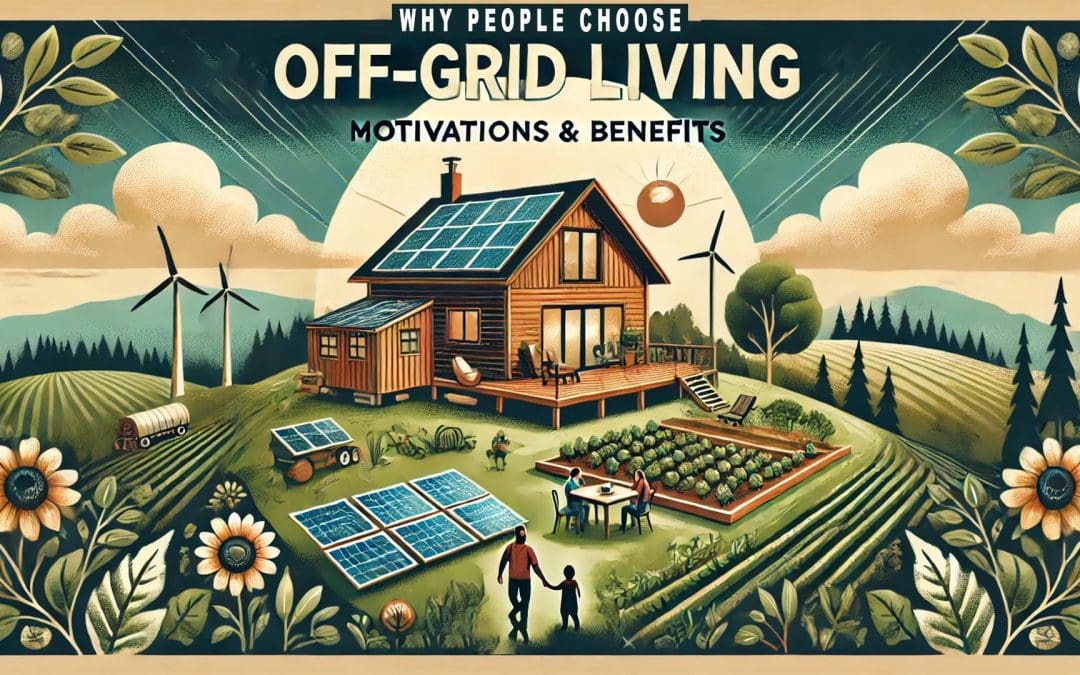More and more people are choosing to leave behind traditional lifestyles and embrace off-grid living. From a desire for freedom and independence to a commitment to sustainability and self-reliance, the motivations behind this shift are as diverse as the people making the leap. But what exactly drives individuals and families to pursue this unconventional way of life? Let’s explore the practical, emotional, and philosophical reasons that make off-grid living such an appealing choice.
The Call of Freedom and Independence
Breaking Free from Utility Dependence
Living off the grid is synonymous with freedom. At its core, it means no longer relying on utility companies for electricity, water, or gas. Off-gridders generate their own power, often through renewable sources like solar panels or wind turbines, and collect their water through rainwater harvesting or wells. This independence not only reduces monthly expenses but also provides peace of mind in knowing that your essential resources are under your control.
Escaping Societal Norms
Off-grid living offers an escape from the constraints of modern society. No more following the expected 9-to-5 grind or feeling pressured to climb a corporate ladder. Instead, it’s an opportunity to design a life based on your values, whether that means spending more time with family, pursuing creative projects, or simply living in alignment with nature.
Living Debt-Free
For many, off-grid living represents a path to financial freedom. By downsizing and embracing minimalism, it’s possible to significantly reduce living costs. Many off-gridders build their own homes, avoiding the burdens of a mortgage, and grow their own food, cutting down on grocery bills. It’s a lifestyle where less truly is more.
Sustainability and Environmental Responsibility
Reducing Carbon Footprints
One of the biggest appeals of off-grid living is its alignment with sustainability. By generating renewable energy, growing organic food, and conserving water, off-gridders drastically reduce their carbon footprints. It’s a lifestyle that prioritizes harmony with the environment over convenience.
Embracing Zero Waste
Off-gridders often adopt zero-waste principles, composting food scraps, repurposing materials, and minimizing reliance on disposable products. Every choice, from using a composting toilet to crafting DIY cleaning supplies, contributes to a more sustainable way of life.
Building Eco-Friendly Homes
Many off-gridders opt for environmentally friendly housing options, such as cob houses, tiny homes, or earthships. These structures are designed to be energy-efficient, use sustainable materials, and blend seamlessly with their natural surroundings.
Financial Benefits of Going Off the Grid
Long-Term Savings
While setting up an off-grid lifestyle can require an initial investment, the long-term savings are substantial. With no utility bills and the ability to grow your own food, living costs become significantly lower over time.
Eliminating Consumer Debt
Off-grid living encourages a focus on essentials rather than indulgences. By embracing a simpler lifestyle, many off-gridders are able to pay off debt faster or avoid it altogether.
Affordable Housing Alternatives
Building a DIY home or living in a tiny house can cost a fraction of what a traditional house does. Pair that with a rural location, where land is often cheaper, and the financial advantages become even more apparent.
The Desire for Simplicity and Peace
Escaping Urban Stress
City life, with its noise, traffic, and endless hustle, can feel overwhelming. Off-grid living offers a chance to trade the chaos for tranquility, surrounded by nature’s soothing sounds and sights.
Embracing Minimalism
Living off-grid often goes hand-in-hand with minimalism. By reducing clutter and focusing on necessities, you create a simpler, more intentional lifestyle that prioritizes quality over quantity.
Building a Stronger Connection to Nature
Living in tune with the seasons, observing wildlife, and growing your own food fosters a deep appreciation for the natural world. It’s a lifestyle that not only supports physical well-being but also nourishes the soul.
Preparedness and Resilience
Self-Reliance for Emergencies
Off-grid living inherently prepares you for emergencies, whether it’s a natural disaster, power outage, or economic downturn. With renewable energy systems, food storage, and water independence, off-gridders are equipped to thrive even when external systems fail.
Building Security in an Uncertain World
From climate change to economic instability, modern life can feel increasingly unpredictable. Off-grid living offers a sense of security, knowing you’ve built a lifestyle that’s adaptable and resilient.
Personal Growth and Fulfillment
Learning New Skills
Off-grid living is a constant learning process, from gardening and carpentry to solar panel maintenance and food preservation. These skills not only contribute to self-reliance but also provide a sense of accomplishment and confidence.
A Deeper Sense of Purpose
Many off-gridders report feeling a greater sense of purpose in their daily lives. Whether it’s the pride of harvesting your first crop or the joy of creating something with your hands, the lifestyle fosters creativity and fulfillment.
Challenges and Misconceptions
Challenges of Living Off the Grid
It’s not always easy—off-grid living comes with its share of challenges. There’s the initial learning curve of managing systems, potential isolation, and the need for regular maintenance. However, for most off-gridders, the rewards far outweigh the struggles.
Addressing Misconceptions
Contrary to popular belief, off-grid living isn’t about giving up modern comforts. Many off-gridders enjoy Wi-Fi, hot showers, and even Netflix, proving that the lifestyle is as flexible as you make it.
Conclusion
The decision to live off the grid is as much about personal values as it is about practicality. It’s a lifestyle that offers freedom, sustainability, and resilience while fostering a deeper connection to nature and yourself. Whether you’re drawn to the financial benefits, the peace of rural life, or the challenge of self-reliance, off-grid living can be a path to a more intentional and fulfilling way of life.

